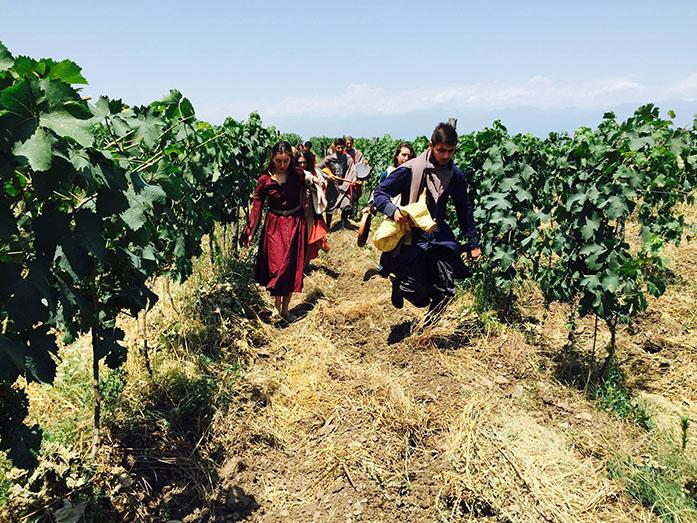MUSIC
What: Zedashe
When: 7:30 p.m. Wednesday
Where: St. Raphael Orthodox Church, 722 E. College
Admission: Free
By Tessa Solomon
[email protected]
Zedashe Ensemble is closing the cultural gap between Iowa and the Republic of Georgia at this year’s Landfall Festival of World Music. The band, hailing from the Georgian fortress-city of Sighnaghi, will perform at 7:30 p.m. Wednesday at St. Raphael Orthodox Church, 722 E. College St.
Ketevan Mindorashvili, a Sighnaghi native, formed the vocal and dance group. Raised with a deep musical appreciation, she has dedicated herself to preserving Georgia’s heritage.
The Daily Iowan spoke with her about Zedashe’s history and upcoming performance.
Daily Iowan: How did Zedashe form?
Ketevan Mindorashvili: The group was started in 1999. We were only five people in the group, mostly women and two boys. This is a very dynamic group; we are always changing people. We learn folk songs and chants from the old people from our expeditions, and we share with our students, our people, and to another world, too.
DI: Can you explain the tradition that the name Zedashe references and what meaning it has for the band?
Mindorashvili: Every family has a sacred place, a tiny church. They keep their great wines and wheat and oil, the best things they produced from their fields and gardens there. They gather there for baptisms, weddings, and they would take the products from this place to celebrate. We place the clay pots, the zedashe, into the ground and pressed the grape juice for wine into the vessel. So every family keep their own special wines there for events. Zedashe means something sacred, something very special for the family and the country.
DI: What significance does music have in Georgia’s culture?
Mindorashvili: We have a saying in Georgia: If you are a proper Georgian, you should know how to dance, sing, and how to chant folk music. It is very important for the Georgians to keep their own traditions, and we are very proud that our young population is interested in Georgian polyphonic song. We have a little music school, with kids from age 12, and now we are touring with four of our students.
DI: How do you prepare for new albums and for performances?
Mindorashvili: It all starts with our expeditions. We are going to the mountains and villages with our recording facilities to find the old people in Georgia who still keep the tradition of the singing and the dancing alive. Then we start to work with the choir, teaching them the voices and the choreographer works with the dancers. Then we rehearse about three times in a week. But for this tour, we rehearsed almost every day for the past two months. It needs patience, it needs love, and it needs time to get through all of it.
DI: How and when did you start touring in the United States?
Mindorashvili: This is the fifth tour. We went to U.S. in 2005 for the first time. Village Harmony is a kind of a music camp that goes all over the world. They came in 2002 to Georgia, to my town. The woman from Village Harmony listened to us, and she liked how we sounded, so she pushed us to do the tours in United States.
DI: How do American audiences usually react to your music?
Mindorashvili: They are in love with Georgian music. Our crowd is people who understand ethnic music. And for the people that understand it, Georgian music is a very high-level music tradition.
DI: What message are you trying to convey through your music?
Mindorashvili: The message is, maybe we don’t speak the same language, but we can feel the music, the harmony, the love. We are not trying to keep just to ourselves, to our generation, but to share with other people.
DI: If the performance at St. Raphael’s is someone’s first experience with Georgian roots music, what should they expect?
Mindorashvili: They should expect they will fly away sitting in their chair and be in their dreams.



